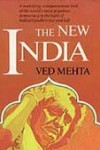
The New India
In this book, Ved Mehta tells the story—hitherto obscured by a combination of censorship, propaganda, and ignorance—of the “new India” that began in June, 1975, when Prime Minister Indira Gandhi, convicted of corrupt electoral practices, under popular pressure to resign, and constitutionally threatened with the loss of her office, in effect carried out a coup in her own country and set about rewriting the constitution to fashion a dictatorship. Opening with a brooding portrayal of the Indian capital in the days before the “new India” began—a time of signs and portents, as in an Elizabethan drama—Mr. Mehta draws up a powerful brief against Mrs. Gandhi, recounting how, with her son Sanjay (whose dynastic ambitions were growing ever more blatant), she ruled by decree; jailed and tortured political opponents; suspended civil liberties and judicial safeguards; silenced the press; and levelled inner-city slums, relocating their inhabitants in barbed-wire-enclosed camps and subjecting them to a program of forced sterilization. He goes on to review Mrs. Gandhi’s life and career, and to disentangle the web of reasons for the downfall of what he calls her “Orwellian regime,” placing the story in its historical and social context, narrating it without polemic and without moralizing, and presenting it piece by piece, as though each event, each figure were part of an engrossing jigsaw puzzle.
This account, written in the elegant and incisive style for which Mr. Mehta is known, is the first accurate report and analysis we have had of the “new India”; it affords a searching look at the world’s most populous democracy in the light of the rise and fall of one of the most mercurial leaders of our time. The elections that in March, 1977, brought about Mrs. Gandhi’s precipitous defeat are, Mr. Mehta concludes, “the most hopeful sign in recent years for the growth of democracy in a poor country.”
New Delhi (1974-75)
“There is a sense of looming calamity here, a sense of danger. One morning, in my parents’ house, I am greeted by the news that the cleaning woman has been electrocuted while hanging the wash on a wire clothesline strung between two lamp posts, which had been rained on during the night. The same night a pig rampaged through the garden, and gave birth there to seventeen piglets. The garden is in ruins and the stench unbearable, and no one knows what to do. The pig (and its piglets) may belong to one of the Untouchable sweepers who camp out in the back lanes. The pig may be his only worldly possession, and if anything should happen to it there might be a sweepers’ riot. Indeed, I hear rumors all the time of murders and of riots touched off by religious or caste conflicts. I read in the newspapers that the government is going easy on the rioters—especially those from militant minority groups— because it is afraid that it will not be able to stop the riots from spreading. I hear reports of intimidation and corrupt practices in high and low places, of knifing incidents and hooliganism in the streets and on the buses, of servants becoming restive. I’ve been visiting India every year for many years now. Each year, fear, corruption, and violence have increased, but this year they seem to have become a way of life.” — From The New India